On this day in 1958, USS Nautilus travels under ice in the Arctic Sea. She’d just become the first to travel, submerged, under the North Pole. Nautilus’s journey under Arctic ice has been called the “Cold War’s most daring mission.”
Things were then in a difficult place, as relations between Russia and the United States became increasingly tense. A space race between the two mesmerized the world . . . but Russians appeared to be winning.
They’d launched Sputnik, the first artificial Earth satellite. Would Russians be able to launch nuclear weapons using the same rockets that had launched Sputnik? Americans needed to answer the stunning Russian achievement with one of their own.
The answer came in the form of a submarine, USS Nautilus: She was the world’s first operational nuclear-powered submarine. Her nuclear core enabled the ship to stay under water for extended periods of time, and it enabled her crew to distill fresh water from sea water and to make oxygen by splitting water molecules.
In general, Nautilus had power available for any need.
“Compared to diesel boats, it had all the creature comforts,” one crew member remembered. “On the Nautilus they could make all the water we wanted. We had washing machines and dryers on the boat.”
It was decided that Nautilus would attempt a trip under the North Pole, demonstrating American power and an ability to quickly travel from one ocean to another. Commander William R. Anderson would captain the sub.
An early (and unsuccessful) attempt at the North Pole had already been made, but Anderson was determined to try again. Thus, “Operation Sunshine” began in 1958.
None of it was easy. Traditional navigational tools don’t work well close to the North Pole. Moreover, the sub would be entering uncharted waters where it was unclear how deep the water—or the ice—might be.
The crew could get lost under the ice, never to be found again. Or a collision with an unexpected ice pack could lead to a cold, watery death for the crew.
Naturally, those brave Americans went anyway.
“I kept effectively two separate navigational tracks,” Nautilus’s navigation officer later explained, “The primary one was a hand dead reckoned position using north-seeking gyro-compass course and log distance. . . . The second track derived its data from the inertial system.”
The sub inched its way toward the North Pole, finally closing in on August 3. Anderson went to the ship’s microphone.
“In a few moments Nautilus will realize a goal,” Anderson told his crew, “long a dream of mankind—the attainment by ship of the North Geographic Pole. With continued Godspeed, in less than two days we will record an even more significant historic first: the completion of a rapid transpolar voyage from the Pacific to the Atlantic Ocean.”
He began his countdown. “10-8-6-4-3-2-1. Mark! 3 August 1958. Time 2315,” he announced. “For the United States and the United States Navy, the North Pole!”
Men aboard the sub used the moment to be the “first” to do something at the North Pole—take a shower, wash clothes. In a moment of humor, one man emerged dressed like Santa Claus, playfully chastising the crew for violating his space.
“Then, suddenly, it was all over, just like Christmas to a child,” Seaman John Yuill said, “all that waiting and anticipation—gone, but unlike Christmas, this would never come again.”
Nautilus ultimately resurfaced near Greenland, sending a message to Navy headquarters, announcing her success.
The world was stunned, as one reporter soon described: “Few maritime exploits in history have so startled the world as the silent, secret transpolar voyage of the U.S. Navy’s nuclear submarine Nautilus.”
Sources can always be found on my website, here.



So many firsts as technology spiraled! This was one of those celebrated during my lifetime. I was a week short of my 8th birthday and so interested in this sort of thing!
I was 12 years old when the Nautilus crossed under the North Pole ice and I remember the elation of the mission.
This feat gave our country and our people a shot in the arm with respect to pride of accomplishment. It was a remarkable achievement.
Thank you Tara.